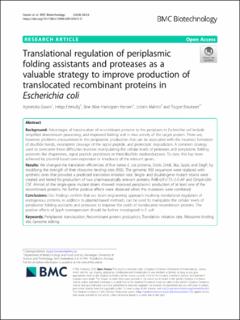| dc.contributor.author | Gawin, Agnieszka Maria | |
| dc.contributor.author | Ertesvåg, Helga | |
| dc.contributor.author | Hartvigsen Hansen, Sine Alise | |
| dc.contributor.author | Malmo, Jostein | |
| dc.contributor.author | Brautaset, Trygve | |
| dc.date.accessioned | 2020-05-15T08:06:58Z | |
| dc.date.available | 2020-05-15T08:06:58Z | |
| dc.date.created | 2020-05-14T10:25:46Z | |
| dc.date.issued | 2020 | |
| dc.identifier.citation | BMC Biotechnology. 2020, . | en_US |
| dc.identifier.issn | 1472-6750 | |
| dc.identifier.uri | https://hdl.handle.net/11250/2654569 | |
| dc.description.abstract | Background
Advantages of translocation of recombinant proteins to the periplasm in Escherichia coli include simplified downstream processing, and improved folding and in vivo activity of the target protein. There are, however, problems encountered in the periplasmic production that can be associated with the incorrect formation of disulfide bonds, incomplete cleavage of the signal peptide, and proteolytic degradation. A common strategy used to overcome these difficulties involves manipulating the cellular levels of proteases and periplasmic folding assistants like chaperones, signal peptide peptidases or thiol-disulfide oxidoreductases. To date, this has been achieved by plasmid-based over-expression or knockouts of the relevant genes.
Results
We changed the translation efficiencies of five native E. coli proteins, DsbA, DsbB, Skp, SppA, and DegP, by modifying the strength of their ribosome binding sites (RBS). The genomic RBS sequences were replaced with synthetic ones that provided a predicted translation initiation rate. Single- and double-gene mutant strains were created and tested for production of two pharmaceutically relevant proteins, PelB-scFv173–2-5-AP and OmpA-GM-CSF. Almost all the single-gene mutant strains showed improved periplasmic production of at least one of the recombinant proteins. No further positive effects were observed when the mutations were combined.
Conclusions
Our findings confirm that our strain engineering approach involving translational regulation of endogenous proteins, in addition to plasmid-based methods, can be used to manipulate the cellular levels of periplasmic folding assistants and proteases to improve the yields of translocated recombinant proteins. The positive effects of SppA overexpression should be further investigated in E. coli. | en_US |
| dc.language.iso | eng | en_US |
| dc.publisher | BMC (part of Springer Nature) | en_US |
| dc.rights | Navngivelse 4.0 Internasjonal | * |
| dc.rights.uri | http://creativecommons.org/licenses/by/4.0/deed.no | * |
| dc.title | Translational regulation of periplasmic folding assistants and proteases as a valuable strategy to improve production of translocated recombinant proteins in Escherichia coli | en_US |
| dc.type | Peer reviewed | en_US |
| dc.type | Journal article | en_US |
| dc.description.version | publishedVersion | en_US |
| dc.source.pagenumber | 11 | en_US |
| dc.source.journal | BMC Biotechnology | en_US |
| dc.identifier.doi | 10.1186/s12896-020-00615-0 | |
| dc.identifier.cristin | 1810946 | |
| dc.description.localcode | © The Author(s). 2020 Open Access This article is licensed under a Creative Commons Attribution 4.0 International License. | en_US |
| cristin.ispublished | true | |
| cristin.fulltext | original | |
| cristin.qualitycode | 1 | |

